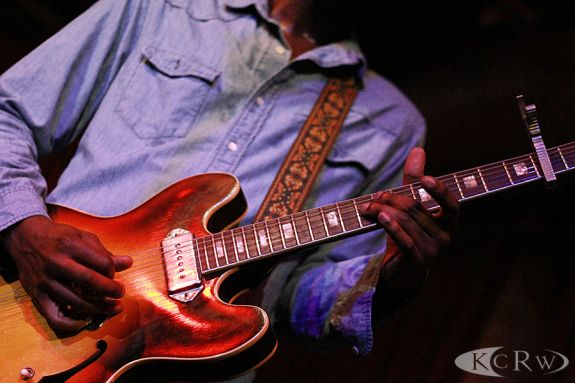[all photos courtesy of Jeremiah Garcia]
We always love a private show. We get to feel all special and included—and this happens so rarely. Especially when it’s located in a swaggy Westside recording studio owned by legendary rock & roll mixer Bob Clearmountain (The Rolling Stones, Roxy Music) and his wife, Apogee Electronics CEO Betty Bennett. If this wasn’t enough, the place was stocked with a classic Wurlitzer jukebox (Richie Valens, The Dell-Vikings, Dion) and more bottled water than an Electric Daisy Carnival and hung with Gothic, Joel Peter-Witkin-esque prints by legendary Hollywood makeup artist Rick Baker and featuring not one but two free beer/wine bars. It may not be the era of the lavish ‘70s junket, but it sure soothed the savage Beast.That is, until the Texas guitarist Gary Clark, Jr. and his quartet took the small stage just after 8pm and the "soothe" was replaced by "savage" for a primal, soulful, earsplitting two-hour-concert of KCRW's Berkeley Street Sessions. A protege of Fabulous Thunderbirds axe-man Jimmy Vaughn and Clifford Antone of Austin's legendary Antone’s club, Clark has been releasing albums on his own Hotwire Unlimited label since 2004 but first poked his head above ground with the release of his Bright Lights EP on Warner Brothers in 2011. His new CD Blak & Blu has only upped the critical “savior of the blues” genuflecting that hasn’t been heard of (at least in the mainstream) since Robert Cray in the mid-1980s. To whit: Blak & Blu sold around 35,000 copies its first week out and eventually landed at No. 6 on the Billboard Top 40 Album Charts. Clark has dueted in concert with Alicia Keys (her request) and joined B.B. King, Mick Jagger and Buddy Guy in a performance at The White House (Barry’s request). To paraphrase Junot Diaz, Brother is blowing UP.
Part of it has to do with the stagnating cul-de-sac in which The Blues has found itself in (set in stone by tourist traps like Memphis’ Beale Street and Chicago’s North Lincoln Avenue). Another might have something to do with the fact that a young black artist who grew up on Hip-Hop and Michael Jackson might draw back musicians and fans who felt The Blues was the lingering language of slavery and represented a powerless acceptance to one’s fate. (Given this perspective, who wouldn't find solace in Public Enemy or Ice Cube?) What Clark has done in his embryonic career is join that schism together by not really playing The Blues at all, but making it just part of his seamless mix. And he does like to wear a knit cap onstage...

During a sitdown interview conducted onstage by KCRW DJ Anne Litt, Clark, Jr. revealed in a soft, contemplative voice the mix of his influences that have made people like Paul McCartney and Eric Clapton perk their ears up at his arrival: Al Green, Prince, Snoop Dogg, 2PAC Shakur, even Tito Jackson (!!), whose “fuzztone solo” on the Jackson 5’s cover of Isaac Hayes “Walk on By” he noted was one of the most influential guitar tracks of his musical upbringing. Growing up in the musical melting pot of Austin didn’t hurt either. “Diversity is here I come from,” he said of the early years honing his craft on Austin’s 6th Street. “Reggae, Jazz, Blues, Country – I just soaked it up.” His openness to seemingly opposing genres may have gelled when he “indulged in turntables and a couple of cheap drum machines while I was learning to play guitar.”
This was evident later on Clark’s gene-splicing of fellow Texan Albert Collins’ “If You Love Me Like You Say” with Jimi Hendrix’s “Third Stone from the Sun,” where he used his guitar to mimic a “scratching” turntablist over a smouldering slow-funk workout. But his powers didn’t end there. Clark offered up clean Chuck Berry riffs on the rockabilly-flavored “Ain’t Messin’ Round” and Johnny Cash’s driving chika-chika sound on “Don’t Owe You A Thang.” He then switched to nasty, molten-magma splats of heavy reverb for the thunderous “When My Train Pulls In” that sounded more like Black Sabbath or Cream than Albert Collins or Clarence “Gatemouth” Brown. The extraordinary “Travis County” veered more towards power pop. “Things Are Changin’” began with a dewy, autumnal prologue seemingly taken from a nature film, before chugging into some E-Z soul worthy of Al Green or The Chi-Lites, with Clark demonstrating his surprisingly soulful vocals. This wasn’t a mimic at work; this was a lab scientist.
Oh, and there was a raffle, too.

[Check out more photos from the concert here.]


No comments:
Post a Comment